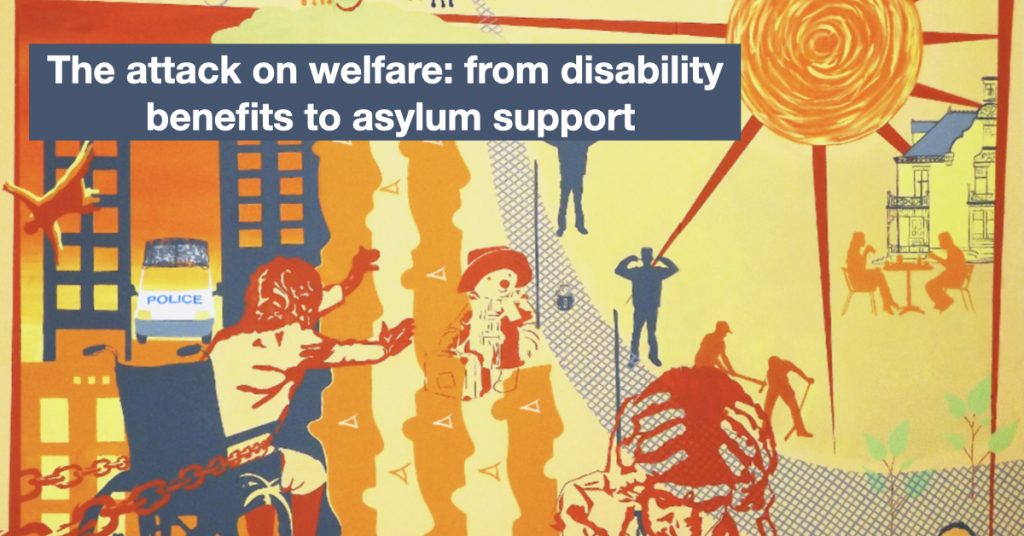Image header: On 23 March 2012, a painted mural composed of the drawings, ideas and messages of disabled asylum seekers was installed in Bristol. Credit: Disability Murals
Sophia Siddiqui analyses the outgoing government’s attack on disability social security, showing how it drew on stigmatising moral panics and followed a similar approach to the attack on asylum welfare in the 1990s. As we await the new government’s approach to welfare reforms, she builds on the insights of those on the front line to argue that disability justice and migration justice are intertwined.
On 19 April, in one of the outgoing government’s last attacks on the marginalised, prime minister Rishi Sunak delivered a speech at the Centre for Social Justice, a right-wing think tank co-founded in 2004 by Iain Duncan Smith, who as secretary of state for work and pensions in the Conservative-Lib Dem coalition government (2010–2015), first introduced benefit eligibility tests for claimants with serious but time-limited health conditions. Sunak outlined his ‘moral mission’ to ‘reform’ the disability benefits system, described as a ‘full on assault on disabled people’ by charities; ‘cruel’ and ineffective’ by health and disability representatives and as ‘another brutal ideological attack on our rights’ by campaigners.
Proposals included reforming Personal Independence Payments (PIP) – a cash benefit designed to help people with a disability, long-term illness, or a mental health condition with extra living costs – through changes to assessments and criteria, and replacing monthly cash payments with vouchers, one-off payments and access to talking therapies. Sunak took particular aim at those receiving PIP due to mental illness, claiming that the increase in people off work is the result of a ‘sick-note culture’ that risks ‘over-medicalising’ the everyday – a view bolstered by the right-wing press and work and pensions secretary Mel Stride, who claimed ‘mental health culture has gone too far’. Labour have so far failed to condemn the proposals, and instead reiterated the framing of mental illness as a burden on the economy in its mental health plan to ‘get people back into work’.
Rather than taking any responsibility for, or even acknowledging, the erosion of systemic rights, the spiralling cost of living crisis and the chronic underfunding of public services resulting from fourteen years of austerity, the proposed reforms were premised on the notion that disabled people and those with mental illness are fraudulent and undeserving. Drawing on stigmatising tropes and ableist narratives, moral panics are confected around welfare dependency as a cover for the damages of austerity.
By analysing how moral panics shift over time to demonise different populations considered ‘surplus’ to labour requirements, or too feckless to work, we can work to undermine processes of stigmatisation and build solidarities between communities.
Moral panics: building consent around welfare retrenchment
‘We cannot allow fraudsters to exploit the natural compassion and generosity of the British people’, Sunak said, arguing that the government needs to ‘crack down on exploitation in the welfare system’. By identifying those who claim benefits as ‘fraudsters’, as opposed to the moral, hardworking taxpayer, he associates them with criminality – despite the Department for Work and Pensions’ (DWP) own statistics showing that there were almost no recorded cases of disability fraud in the year ending April 2024.
The aim is to sanction public fear and a sense that ‘hard working taxpayers’ are being unjustly taken advantage of – ultimately working to harden people to the suffering of others and build public support for the further retrenchment of social services.
PIP, which was introduced in April 2013 as part of the Welfare Reform Act 2012 to replace the Disability Living Allowance for people of working age, is described as an ‘irresponsible burden’ to ‘generations of taxpayers’, portraying a relationship of dependence: ‘when the taxpayer is supporting you to get back on your feet, you have an obligation to put in the hours.’ (As Frances Ryan, author of Crippled: austerity and the demonisation of disabled people pointed out, PIP is not an unemployment benefit, and therefore many who receive PIP also pay taxes, misinformation also perpetuated by the Labour party). Sunak singled out young people for being ‘parked on welfare’ whilst their ‘dreams slip further from reach’ – depicting those on long-term sick leave as lacking ambition and in a stagnant state of dependency. This was echoed by Liz Kendall, the new work and pensions secretary, who said that there would be ‘no option for a life on benefits’ under Labour, declaring that ‘Labour is the party of work’. Since being elected, it’s clear that Keir Starmer is defining the Labour Party along these lines, promising to reward those who ‘work hard’ and ‘play by the rules’.
Such rhetoric creates stigma, ‘the lubricant of neoliberal capitalism’, which according to sociologist Imogen Tyler ‘functions to devalue entire groups of people, with the purpose of fortifying existing social hierarchies, reproducing inequalities and creating new opportunities for capital’.[1] Stigma can be internalised by those it is directed against with damaging effects, and can also drive violence, with a survey showing that one in six of disabled people who have been verbally or physically assaulted said their attacker had called them ‘scroungers’.
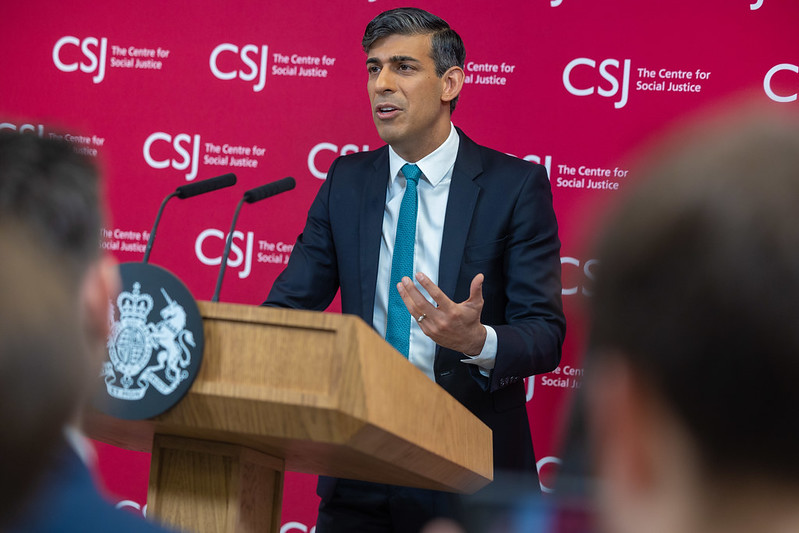
Continuities in rhetoric: from ‘bogus asylum seekers’ to ‘welfare scroungers’
The depiction of disabled people who claim benefits as fraudulent, undeserving and a burden on society, is all too redolent of the moral panics around ‘welfare scroungers’ and ‘benefit broods’ perpetuated by the media and politicians on the so-called Left and Right.
But also, there is a clear continuation from the ways in which people seeking asylum have been portrayed. In the run-up to the 2001 general election, Conservative Michael Heseltine, writing for the Daily Mail, claimed that:
‘A very large number of those seeking asylum are cheats, quite deliberately making bogus claims and false allegations in order to get into this country… the problem of phoney asylum seekers was likely to grow as the impression spread that this country was a soft touch … I could see no reason why my most vulnerable constituents – honest and hard working people who paid their taxes all their lives – should be pushed to the back of the queue for housing and hospital treatment by dubious asylum seekers’. (1 January 2001)[2]
Those seeking asylum were depicted as ‘cheats’, ‘phonies’ and a threat to the ‘honest and hardworking people’– an earlier iteration of the dichotomy of the ‘fraudulent welfare claimant’ and the ‘hard-working taxpayer’. Britain is portrayed as being a ‘soft touch’, a feminised nation that is vulnerable to being taken advantage of, and therefore justifies a ‘tough’ response. The Labour Party doubled down on this approach, with David Blunkett (who was appointed home secretary in June 2001) pledging to Sun readers he would ‘blitz society of asylum cheats’.[3] The consequence of such vilification was a sharp rise in racist violence against asylum seekers and migrants.[4]
It’s crucial to draw out these links historically, between attacks on asylum seekers and attacks on those claiming welfare to show how these are confected moral panics that serve to build support for wider punitive ‘reforms’.
Continuities in policy: the retrenchment of asylum welfare
As previously mentioned, Sunak, in his speech, had proposed that disability benefits should be changed from monthly cash to a voucher system – a trajectory we have seen before in asylum welfare. Asylum seekers are, in researcher-activist Rebecca Yeo’s words, ‘experimental subjects’ in a ‘broader systemic agenda of inequality’. Continuities can be traced between the current attack on the disabled and how access to asylum welfare has been steadily restricted from the 1990s onwards.[5]
From 1992, ministers were looking to cut benefits and erode asylum rights, with Peter Lilley (secretary of state for social security in John Major’s Conservative government) telling the Conservative Party conference in 1992 that he is ‘closing down the something for nothing society’ and tightening up on ‘scroungers’ and ‘bogus asylum seekers’. The 1993 Asylum and Immigration Appeals Act limited housing obligations of local authorities to asylum seekers and the 1996 Asylum and Immigration Act removed access to social housing and benefits for asylum seekers.
New Labour, elected in 1997, completed the exclusion of migrants from the welfare state and put in place a ‘separate system of welfare provision for asylum seekers, linked to immigration control, not social care’ ensuring that ‘asylum seekers living in the UK would be treated as a suspect community’ and therefore subject to surveillance and control.[6] Anyone subject to immigration control was excluded from all mainstream welfare benefits,[7] and the right to any acknowledgment of the extra costs associated with disability was taken away from asylum seekers.
A new Home Office Agency was established, National Asylum Support Service (NASS), whereby destitute asylum seekers are given no-choice dispersal accommodation and a pitifully small weekly sum for all living expenses. Cash benefits were replaced by vouchers, justified as an anti-fraud measure – with Jack Straw, the home secretary at the time, claiming that ‘cash benefits in the social security system is a major pull factor that encourages fraudulent claims’. Vouchers are an instrument of stigmatisation that can render people more vulnerable to racial violence. After pushback from asylum and migration networks, trade unions and civil society groups, the NASS voucher system was phased out in 2002.
It is deeply concerning that we are seeing disability welfare following a similar trajectory to asylum welfare, justified through ‘anti-fraud’ rhetoric.
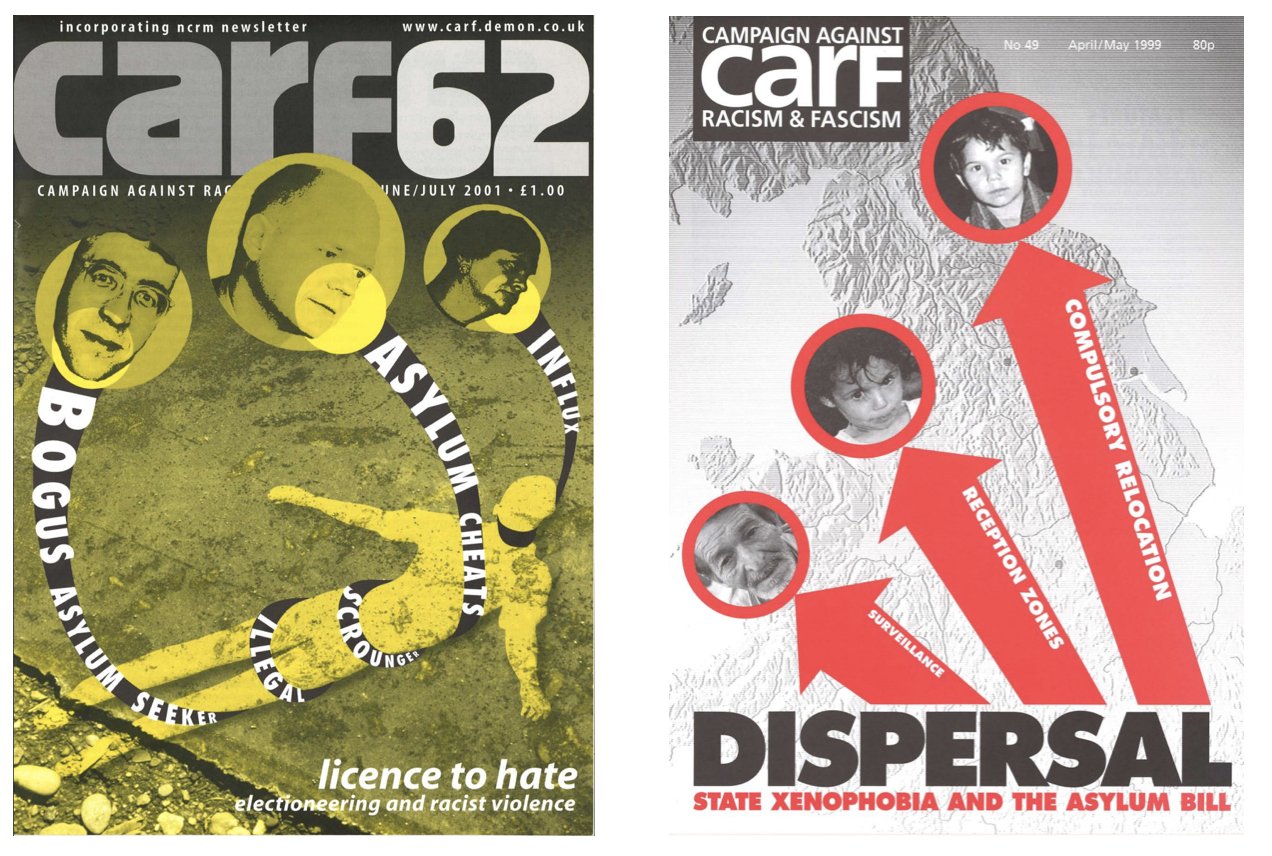
Welfare violence: the cost of deterrence
Deterrence (of new claims) is an approach that shapes asylum and immigration policy. The same philosophy of deterrence is embedded within the welfare system, effectively a ‘hostile environment’ against claimants of benefits, and is only looking to get further entrenched.
PIP is already incredibly difficult to access. Many with long-term conditions have to make repeated fresh claims for PIP, and regularly attend medicals and complete complicated forms, causing stress and insecurity. As shown by Citizens Advice, changes to tax-benefits and public services disproportionately affect Black and Asian families, with pre-existing inequalities leaving racialised communities more vulnerable to the cost of living crisis.
The existing huge backlog for PIP health assessments, with more than 430,000 people awaiting a review, would only be made worse by complicating the process through receipts and vouchers. ‘This system of monitoring people and humiliating them is extremely expensive to administrate’, writes geographer Danny Dorling, ‘the purpose is not to save money but to maintain social control and a steep social hierarchy’.[8]
The mother of Ker Featherstone, a 21-year-old disabled man who committed suicide in 2019 weeks after DWP cut his PIP, called the PIP assessment ‘torture’ that ‘made the distress he was experiencing all the more excruciating’. A recent inquest found that Phillipa Day, a young disabled mother who took her own life in 2019, had been left with ‘debilitating anxiety’ by the actions of DWP and its contactor Capita, and that the flaws in the disability benefits system were ‘the only acute factor’ of her suicide. DWP’s own figures show that thousands have died whilst caught up in the system.
These deaths are not just a result of mistakes in the system, but consequences of systemic failure and cumulative harm. These are just two examples of the many benefit-related deaths recorded in the Deaths by Welfare timeline co-produced by China Mills and John Pring, which makes visible the slow, bureaucratic accumulation of harms and deaths that result from the government’s dehumanisation of people who claim benefits. Disabled activist groups, including Disabled People Against Cuts and the Mental Health Resistance Network continue to work tirelessly to ensure that welfare reform deaths are made public and campaign to end benefit-related deaths.
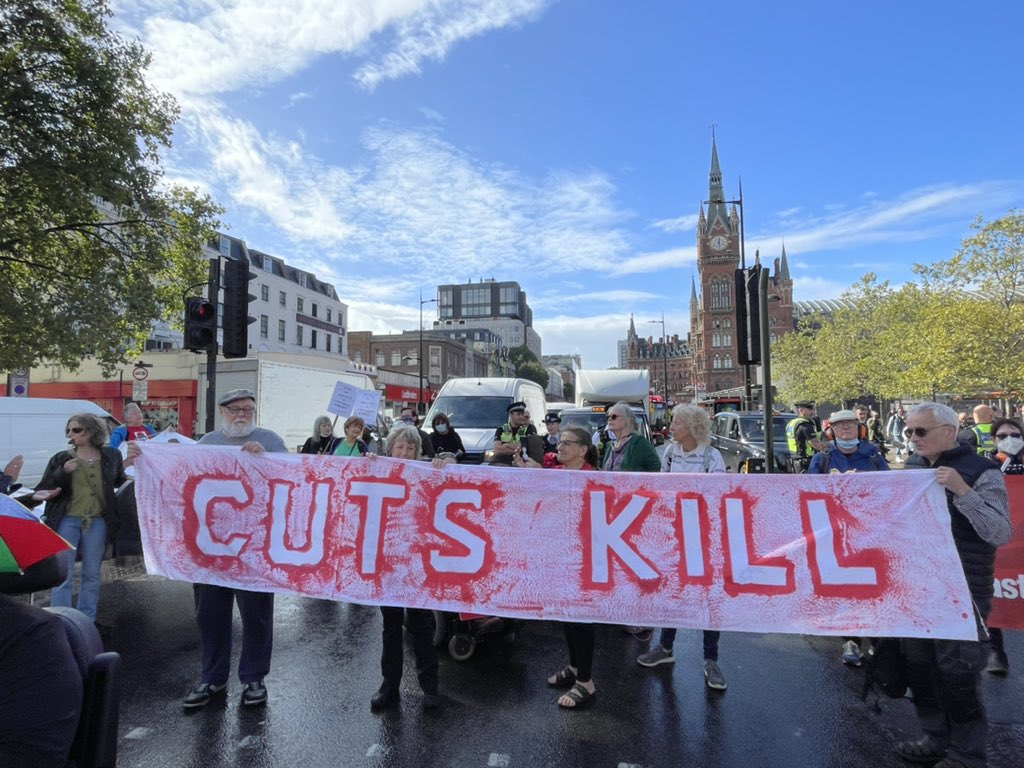
Disability and migrant justice
Struggles for migrant justice and disability justice are deeply intertwined. For those who have a physical or mental impairment and are subject to the cruelty of the immigration system, accessing state support can be impossible. Earlier this month it was reported that a 27-year-old Syrian father, who is partially blind and deaf, and cannot leave the house without a wheelchair after a bike collision left him with a brain injury, has been repeatedly refused disability benefits, with the Home Office refusing to lift his no recourse to public funds condition.
The asylum system itself is disabling, resulting in the exacerbation of existing impairments, the creation of new impairments and significant mental distress. For those in asylum housing, conditions are described as inhumane. In September 2023, one of the 55 disabled people seeking asylum housed at a former Essex care home went on hunger strike for four weeks in protest at their conditions, where there are no trained care workers or nurses present. Three months earlier, an Iranian resident, Behnam Murufi died after being denied the wheelchair that doctors said he needed after a number of strokes.
Bringing together insights and resistance of the disabled people’s movement with those in the asylum and immigration system is more vital than ever, as fear is being weaponised by politicians. Activists across the country have long been doing this work, collectively creating murals to claim public space, as well as coming together to build solidarity.
The Disability and Migration Network, set up by Rebecca Yeo, creates a space for disability justice and migrant justice movements to be able to work towards building a wider movement of solidarity and resistance. In conversation with Rebecca Yeo, she highlights the need to resist siloed working:
‘It’s not surprising that we see policies imposed on asylum seekers gradually extended to disabled people, and vice versa, with civil servants and government ministers moving across departments. Whereas in the voluntary sector and in activism, it’s often that people get involved in one sector and are completely absorbed in that area. We have to take active measures to learn from each other and organise together’.
By recognising the interlinking of struggles and learning from each other’s movements both historically and in the present day, we can work towards building a cross-sectional solidarity that resists the dehumanisation embedded in the social security and immigration regime.
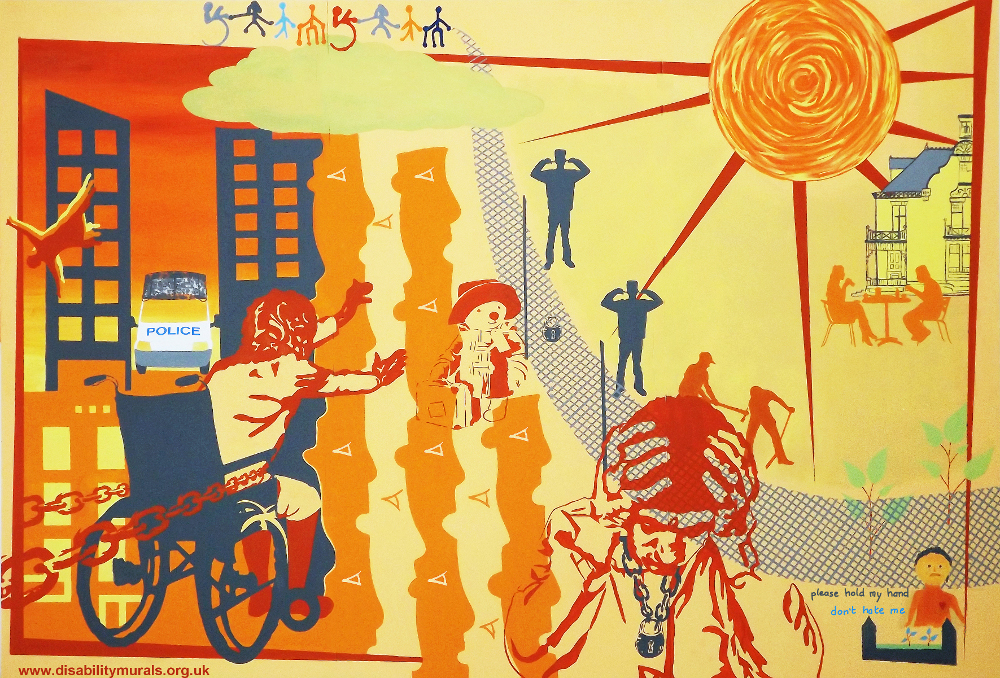
Resources for further information*
Disability and Migration Network
Deaths by Welfare project, Healing Justice
Disabled People Against the Cuts
No Recourse to Public Funds Network
Migrants Rights Network Disability Zine
*This is a non-exhaustive list, please get in touch if you are doing work in this area and would like to be added to the list.
[1] Imogen Tyler, Stigma: the machinery of inequality (London: Zed books, 2020), p. 189
[2] Quoted in Tyler, Revolting Subjects: social abjection and resistance in neoliberal Britain (Lodon: Zed books, 2013).
[3] CARF, 62, https://irr.org.uk/app/uploads/2017/06/62.pdf.
[4] CARF, 64, https://irr.org.uk/app/uploads/2017/06/64.pdf.
[5] For a summary of how access to asylum welfare has been steadily restricted from the 1990s onwards under both Conservatives and Labour governments, as well as how policy changes were resisted on the ground, see Frances Webber, Borderline Justice: the fight for refugee and migrant rights (London: Pluto Press, 2012), Chapter 5.
[6] Fekete, ‘The emergence of xeno racism’, Race & Class 43, no. 2 (2001) p. 30.
[7] It’s worth noting that immigration rules have stipulated ‘no recourse to public funds’ for migrant workers and their dependents since at least 1983. The 1999 Act removed the eligibility of those subject to immigration control to mainstream benefits.
[8] Danny Dorling, Shattered Nation: inequality and the geography of a failing state’ (London: Verso, 2023), p. 66.

